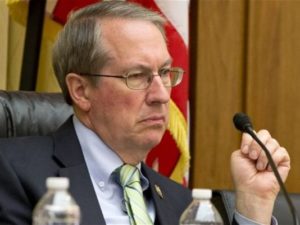Bob Goodlatte to unveil sweeping music copyright reform package
U.S. Rep. Bob Goodlatte, chairman of the powerful House Judiciary Committee, plans to introduce an umbrella music licensing bill in March, a clear indication that long-sought federal copyright reform could be enacted in 2018.
Goodlatte’s staff briefed other Congressional staffers and key music industry stakeholders last week, multiple sources told The Tennessean.

According to sources who received the briefing, the broader bill from Goodlatte will include the Music Modernization Act, the Classics Act and the AMP Act. A House Judiciary aide said the committee expects to mark-up a package of copyright bills in the coming weeks, but provided no additional details.
The Music Modernization Act would overhaul the digital mechanical licensing process and lead to better payouts for songwriters, according to advocacy groups representing songwriters and publishers. The Music Modernization Act was filed after more than a year of negotiations, spearheaded by U.S. Rep. Doug Collins and Sen. Lamar Alexander, between songwriters, publishers and streaming companies.
More: Music copyright reform gains traction as coalition backs key legislation
The Classics Act would require digital radio companies to pay artists and labels royalties for songs recorded prior to 1972.
And the AMP Act would codify the existing practice of paying music producers compensation stemming from digital royalties earned by artists.
Those three bills have received the endorsement of a broad coalition of advocacy groups representing virtually every corner of the music industry.
Goodlatte has overseen roughly five years of hearings and debate about music copyright reform. The Virginia Republican is not seeking re-election, and 2018 is viewed as the last, best chance to pass a broad scale music copyright reform, which hasn’t happened in decades.
So his support is a promising sign a broad music copyright reform package could happen. Collins, R-Georgia, U.S. Rep. Hakeem Jeffires, D-New York, and Alexander, R-Tennessee, are among the key leaders in Congress on the issue of music copyright reform.
Tennessee’s Congressional delegation, including U.S. Rep. Jim Cooper, U.S. Rep. Marsha Blackburn and Sen. Bob Corker, have been vocally in favor of updating copyright laws to benefit music industry professionals in the state.
But there are some questions among stakeholders about whether Goodlatte will choose to include other bills that haven’t received the same universal endorsement of the music industry. Two other pieces of legislation under are consideration to be included in the broader bill, according to multiple sources who received the briefing.
One bill that could be included is the Register of Copyrights Selection and Accountability Act. The bill, which passed the House, but not the Senate last year, would give Congress power in choosing the important Register of Copyrights appointment. Under current law the position is filled by the Librarian of Congress.
Another bill that Goodlatte could add is the CASE Act, which would create a copyright small claims court for disputes under $15,000. Those bills each have support from some music industry groups, but not universal backing of the broader coalition, which calls into question whether their inclusion would jeopardize the package.
More: Songwriters, streaming companies strike landmark deal on music licensing
More: How Lamar Alexander brokered deal that led to Music Modernization Act
It was groundbreaking news last month when virtually every key music industry advocacy group announced support for the Music Modernization Act, the AMP Act and the Classics Act.
The Music Modernization Act’s introduction was seen as a success because streaming companies immediately offered support. The bill would create a new digital mechanical licensing organization, run by publishers and songwriters, to identify and pay songwriters and publishers digital royalties. It would also eliminate the legal liability that has led to expensive lawsuits against Spotify and Apple Music for not properly licensing songs.
Reach Nate Rau at 615-779-8011 and nrau@tennessean.com. Follow him on Twitter @tnnaterau